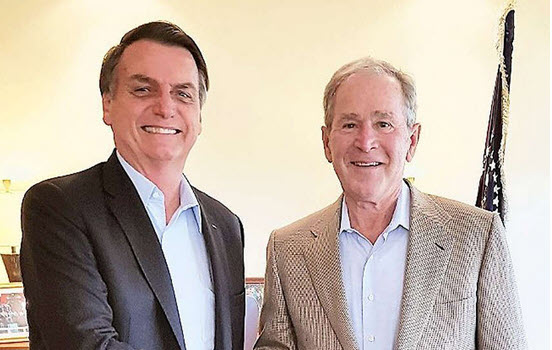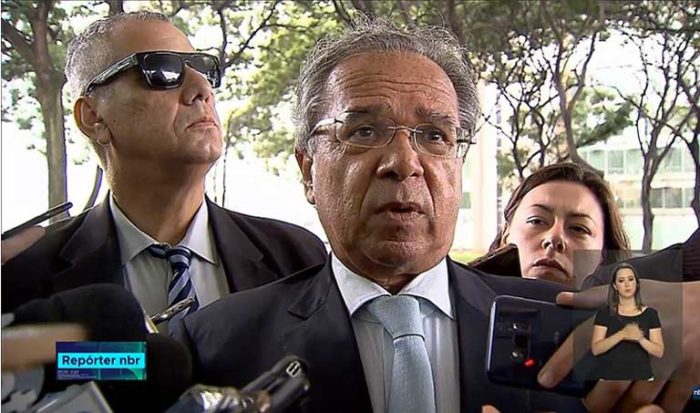Is this the beginning of the end or the end of the beginning for Bolsonaro?
São Paulo, 27 May. Crowds dressed in green and yellow took to the streets this Sunday in support of President Jair Bolsonaro. The more extreme protesters demanded the closing down of the Supreme Court and Congress, but others wanted the immediate approval of the government’s Pensions Bill and anti-crime measures. A giant inflatable Sergio Moro, the Justice Minister, dressed as Superman, towered over protesters on the grass in front of Congress in Brasilia.
Demonstrators appeared in 156 towns and cities. But this was still fewer than the 220 where over a million protested against cuts in the education budget on 15th, and the Education Minister’s ill thought out attacks on federal universities.
Disillusioned
Many first round Bolsonaro supporters had declined to take part, disillusioned with his performance in his first five months and in disagreement with the more extreme demands. The president himself was persuaded that it was not a good idea to take part in an anti-system protest when he was after all part of the system.
Recent events have provided ominous echoes of the past. In 1992 President Fernando Collor urged his supporters to take to the streets in yellow and green, but the crowds turned out wearing black and he didn’t last much longer. In 1961 President Janio Quadros blamed ‘occult forces’ for stopping him from governing and then resigned, hoping to be returned to power in the arms of the people. Instead vice president Jango took over.
Last week on social media, his favourite means of communication, Bolsonaro published an anonymous text saying Brazil was ‘ungovernable’ outside political cliques. He also shared a video of an African preacher who declared Bolsonaro had been ‘chosen by God’ to be president, commenting that the country’s future was in the hands of the people. These remarks have been interpreted by some as the first step in the direction of an ‘auto-golpe’ or auto coup.
But the demonstrations, modest as they were, did provide a temporary relief for a president now under a constant barrage of criticism from the moderate right and centre of the political spectrum as well as from the left.
When all three major newspapers, none of them remotely leftwing, publish editorials saying that the president is incapable of running the country, that his government is a disaster, then you know the crisis is real, not fake news.
The word “impeachment ‘ is once more being bandied about, as Bolsonaro flounders, unable to get any of his bills approved in Congress, indifferent to record unemployment and falling GDP, afraid to appear in public places for fear of hostile crowds, responding to mass demonstrations against his cuts to the education budget with insults.

Government by U-turn
The president’s agenda is marked by U-turns. When some absurd statement on social media is questioned, Bolsonaro either denies it or says it has been misinterpreted. He has singlehandedly plunged Brazil’s international reputation to its lowest level since the dictatorship. Unable to go to New York to receive an honour from the Brazilian Chamber of Commerce, because no institution wanted to host the event in protest at the destruction of the Amazon rainforest, he went instead to Dallas, where the local mayor also refused to meet him. Itamaraty hurriedly improvised a meeting with retired (and bemused) president George Bush.
The anti-environment Environment Minister Ricardo Salles abruptly cancelled a long prepared UN Climate event in Salvador, saying the participants were only coming to eat acarajé and see the sights, but then had to reverse the decision when the Mayor of Salvador, chairman of the Dems, a right-wing party which is in coalition with the Bolsonaro government, explained that the presence of several thousand people, be they environmentalists or not, was good for tourism.
Bolsonaro’s ill thought out decree, widening gun ownership, including highly lethal assault rifles, to include millions of people without checks or registration, led to an immediate jump in gun sales. Fourteen state governors signed a joint letter saying it would not make their states safer, but on the contrary, bring more violence by increasing the quantity of guns and munitions in circulation that could end up in criminal hands. The president’s decree is also being contested in the Supreme Court and is expected to be amended in Congress.
Corruption is back
Bolsonaro’s own party, the newly created PSL, is so riven by internal squabbles among its novice congress members that it is completely ineffective and the old ‘centrão’ – the block of centrist and rightwing deputies now calls the tune.

Elected on an anti-corruption platform, his son Flavio Bolsonaro, senator for Rio, is under investigation by the prosecutors’ office for financial crimes, and is suspected of links to the illegal militia, including men involved in the assassination of councillor Marielle Franco.
Another son, federal congressman Eduardo, says he thinks Brazil needs to have an atomic bomb, in order to be taken seriously.
Pension panacea
The flagship pensions reform bill, on which Economics Minister Paulo Guedes has staked his reputation, threatening to resign and move abroad if it is not passed, is under a barrage of criticism, as studies show that far from ending privileges, it will punish the poorest.

The government’s entire economic programme seems to be based on passing the Pensions Bill, because it will allegedly save a trillion reais, plug the deficit, bring back foreign investment and provide jobs. In other words a magic cure for Brazil’s ills. Alternative, or additional solutions, like tax reform, job creation, public investment, are simply not being contemplated.
Cry havoc and let slip the dogs of war
This virtual blackmail – pass the bill or there will be chaos – has an ulterior motive, according to quite a few analysts. They believe Bolsonaro actually wants chaos, because ‘crisis is an indispensable ingredient for an authoritarian process’. Then by blaming the crisis of government on ‘balburdia’ ‘corruption’ and ‘the old political system’ he can justify strong arm measures.
At the same time his incompetence and truculence are leaving him more and more isolated, as many who voted in Bolsonaro for anti-PT reasons, realise they have elected someone who does not know how to run the country, and who is incapable of introducing the reforms that Brazil needs. This leaves him with the far right and the military as the nucleus of his support.
In the five months Bolsonaro has been in power, he has failed to propose any measures for lifting Brazil out of its state of economic stagnation, with 13 million unemployed and over 20 million underemployed. Instead he has insulted and antagonised large sectors of the population, relaxed gun laws and Amazon monitoring and stoked violence against indigenous and rural populations and favela communities. His presidency is a disaster, but civil society is reacting. On 30 May there will be another nationwide protest against education cuts.
